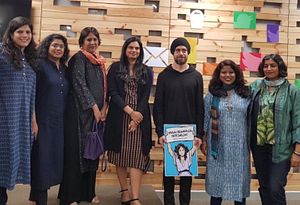The complexity of India’s social structure — its castes, varnas, jatis, religions, languages, tribes, communities — is a mine-field to navigate for many Indians, let alone non-Indians. Twitter’s CEO Jack Dorsey’s failure to do so during a recent trip to India blew up spectacularly, though the fault was not his.
All seemed well at first. During his trip, Dorsey met Indian Prime Minister Narendra Modi, an avid Twitter user. Modi is one of the most popular individuals on Twitter, with 44.4 million followers. After meeting Dorsey, Modi tweeted “I enjoy being on this medium, where I’ve made great friends and see everyday the creativity of people.”
Things then turned sour, with Dorsey eventually being accused of “hate mongering,” “Hinduphobia,” and “inciting violence,” after meeting with a group of “journalists, writers and activists in Delhi to hear about their experiences on the website and app, which has been criticised for facilitating the abuse and harassment of prominent Indian women.” One of the activists, from the Dalit (“untouchable”) community gave Dorsey a poster which read “Smash Brahmanical patriarchy,” in reference to the highest social group in traditional Hinduism, the Brahmins. A photo of the event, which was supposed to be off the record, was circulated on Twitter afterward.
The photo sparked anger from the Hindu right, which opposes the hereditary notion of caste, but generally argues that the notion that the caste system was built on the oppression of lower castes to be insulting to Hinduism. One prominent Hindu thinker on Twitter, Rajiv Malhotra asked: “Is this demonology of Brahmins by foreign #BreakingIndiaForces acceptable? Is it hate speech?”
On the other hand, activists and others criticized Twitter for apologizing for Dorsey’s picture afterward; Vijaya Gadde, Twitter’s legal and policy head told one user: “I’m very sorry for this…It’s not reflective of our views. We took a private photo with a gift just given to us – we should have been more thoughtful…Twitter strives to be an impartial platform for all…[w]e failed to do that here & we must do better to serve our customers in India.” In response, Sandhya Ramesh, a science editor for The Print tweeted: “Terribly disappointing st. on behalf of Twitter. Both Brahminism & patriarchy are oppressive by nature, so why would Twitter’s views not reflect giving space to marginalized voices?”
One simply cannot win.
It is highly unlikely that Dorsey was aware of any of this before posing for the photo, other than perhaps having a vague understanding of India’s caste system. He could hardly be accused of an agenda to “break India,” and though Twitter has been accused of a liberal bias, it has well-known, public policies on user content.
Some Indians are overly touchy about any speech that could be constituted as offensive. Any criticism, questioning, debate, or investigation into India’s society, history, and religions is considered suspect. That being said, making broad statements against a group isn’t the most reasonable path to take. It is not hard to see how accusing the Brahmins, a group of millions with many different individual circumstances, of dominating India’s social system, can be viewed as akin to anti-Semitism. Yet, it is highly doubtful that this cultural context is well-known to many non-Indians. Indians would in fact be quite surprised at the lack of knowledge of their nation’s social complexity in the West, if the brief mentions of Indian history in the average high school curriculum in the United States are anything to go by.
Thus, Twitter should not be held to fault. It is a forum for debate, much of which is inevitably acrimonious. This is true in India, as well as in Twitter’s home country, the United States. Much of the controversy generated on Twitter in India is over the nature of India’s society, history, and religions, with different factions, academics, armchair historians, left, right, secular, religious, Hindu, Muslim, Sikh, Christian, higher-caste, lower-caste, north-Indian, south-Indian — you name it — battling and advocating their views. No matter what, someone is bound to get offended. Should everyone be accused of having an agenda or even activity that can be considered criminal, such as defamation, in many jurisdictions around the world?
This reinforces the classical liberal view of the 19th century that speech and expression should not be criminalized unless it poses an immediate and direct threat to security, for otherwise almost anything can be constituted as criminal, if it offends someone. Beyond legality, the suppression of debate never does knowledge any good: debaters should be open to other ideas and arguments. But given current trends, this is wishful thinking. People, regardless of their positions, are generally not wont to hear things that they do not wish to. Nonetheless, Indians ought to be thankful that their constitution guarantees freedoms of speech, religion, and expression, which are mostly upheld, that would otherwise be in quite some danger as politicians of all stripes and parties are quite thin-skinned.

































